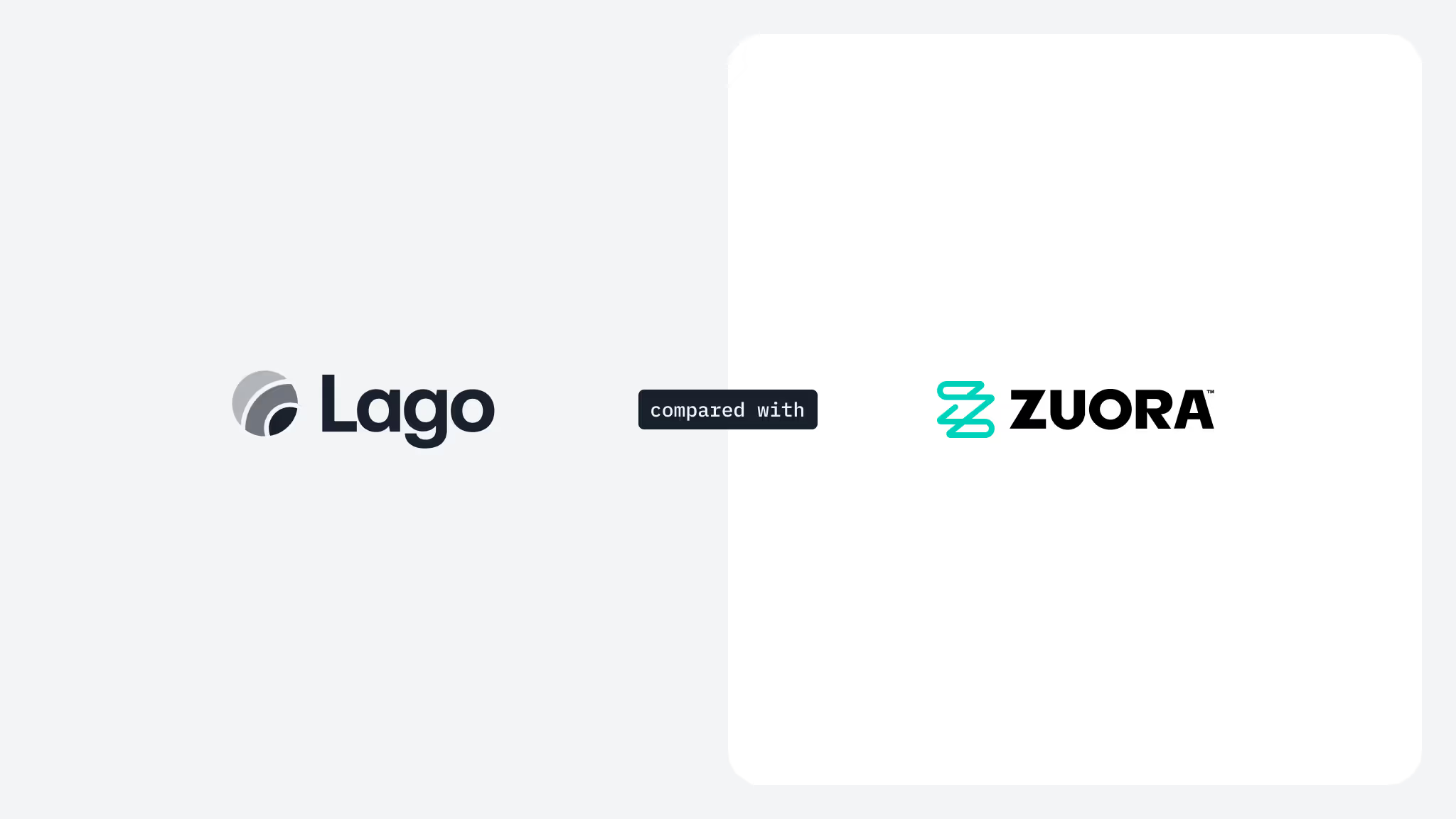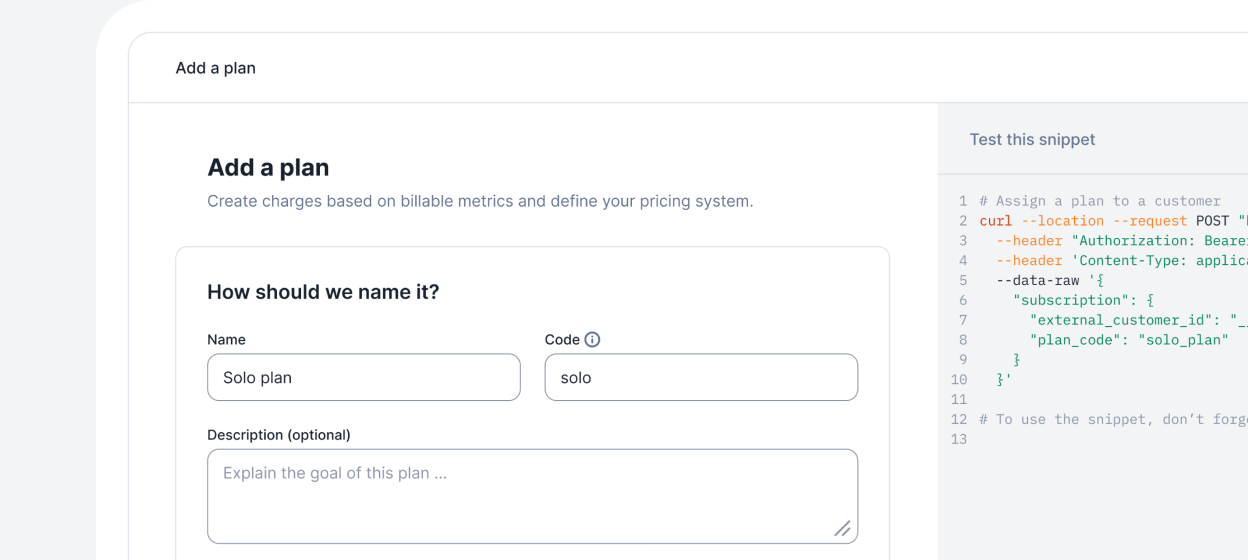Lago, best Zuora alternative for usage-based Billing

What is Zuora?
Zuora, founded in 2007, is a cloud-based subscription management platform designed to assist medium and large enterprises in effectively managing subscription services. Zuora offers a suite of applications, including Zuora Billing, Zuora Revenue, Zephr, Zuora Payment, Zuora Platform, Zuora CPQ (Configure, Price, Quote) and Zuora Monetization Suite.

What is Lago?
Lago is an open-source metering and usage-based billing solution. It offers a self-hosted and cloud-based, scalable, and modular architecture to manage subscriptions, usage based billing and all the nuances in between. It's the go-to choice for companies that require a powerful tool to handle complex billing logics, allowing you to build a comprehensive billing system from scratch with ease.

How is Lago different from Zuora?
This article points out the differences regarding Billing capability between Zuora and Lago. Following that, it provides readers with a comprehensive overview and extends support for evaluating and selecting the most suitable billing system.
1. Feature comparison
Usage-based Billing
Zuora supports straightforward pricing models such as subscriptions and standard usage-based pricing (e.g. $20 per user). However, it may not be flexible enough for businesses that need support for complex usage-based pricing models.
Lago is designed for usage-based pricing models, providing a high level of flexibility. This allows businesses to implement and tailor pricing models that accurately reflect your unique strategies and revenue structures, especially when dealing with intricate billing scenarios.
For example, both software can handle standard subscription pricing like Netflix’s subscription model, and basic usage-based pricing like Twilio's per-message rates. However, for percentage pricing like PayPal's per-transaction pricing with a percentage and fixed fee, plus minimum and maximum limits, Zuora can not do it, whereas Lago offers flexibility to configure these models.
High volume processing
Zuora expects no more than 25 million usage records per month and recommends users to contact their support team for higher usage processing. Additionally, when generating an invoice, there is a default limit of 200,000 usage records for each charge per billing period.
Lago has no limits on usage records and facilitates high volume processing.
Invoicing operations
Zuora allows businesses to create and customize multiple invoice templates for various needs. However, Zuora limits custom fields in invoices within specific objects listed here.
Lago offers support for Customer metadata enabling the storage of additional structured customer information and the option to display this metadata on invoices. Additionally, Lago provides an advanced feature called Grace period, which allows you to review and make any necessary adjustments before finalizing an invoice.
2. Ease of use
Zuora offers a powerful billing system with a wide range of features, but it does come with a steep learning curve. Setting up and managing it can be time-consuming and challenging, particularly for small businesses without extensive IT resources.
Lago is a developer-first product with an intuitive interface. It simplifies tasks like setting up billable metrics, configuring subscriptions, managing customers, and generating invoices. All actions can be performed via the API or the user interface, making Lago accessible to both tech-savvy and non-technical users alike.
3. Pricing
Zuora is organized into multiple applications. Each of these apps comes with separate fees. Since Zuora’s pricing is all custom, it’s hard to get a sense of what the platform will cost and which capabilities you will be paying for. However, it can potentially be costly, especially for smaller businesses with limited budgets.
Lago offers a forever-free Open source solution for small businesses, allowing access to fundamental billing features. Besides, Lago provides Startup and Enterprise Plans with access to premium features listed here.
4. Transparency matters
Transparency is one of the 8 things to consider when choosing your billing system. When choosing a third-party billing solution, it's essential to ensure your team understands its architecture. This knowledge is invaluable, especially for tricky scenarios. You want to avoid being in the dark when trying to resolve critical issues.
If you opt for a closed-source solution like Zuora, push for transparency and try to understand how it works.
Lago, being open-source, offers complete transparency, allowing engineers to audit its code and even build on top of it. And the best part is, it’s always free and accessible. So, Lago serves as a fall back option without vendor lock-in concerns. What’s the fallback option for a tool like Zuora? The pertinent question arises: what if Zuora discontinues its product or enforces a significant price hike?
Conclusion
Zuora is well-suited for large enterprises seeking an all-in-one solution. It covers payment processing, subscription billing, revenue recognition, and CPQ. This complexity can be a challenge for small businesses with limited IT resources. While Zuora handles basic pricing models well, you may need to explore alternative billing solutions for more complex pricing structures.
Lago is a solid choice for businesses requiring a high-powered billing solution, especially for complex subscription and usage-based billing. It offers advanced features and high flexibility. Lago is suitable for businesses at various stages of growth due to its scalable and modular architecture.
TL;DR: Table of comparison Lago vs. Zuora
- Offers a suite of applications with separate fees.
- Pricing is all custom.
- Offers a cloud hosted and self hosted premium version.
For example, iterating on pricing, creating plans, customers and invoices can be quite cumbersome and time-consuming.
Focus on building, not billing
Whether you choose premium or host the open-source version, you'll never worry about billing again.
Lago Premium
The optimal solution for teams with control and flexibility.

Lago Open Source
The optimal solution for small projects.

